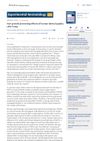Search
for
Sort by
Research
630-660 / 780 resultsresearch Overview of Alopecia Areata
Alopecia areata is a genetic and immune-related hair loss condition that is often associated with other autoimmune diseases and does not typically cause permanent damage to hair follicles.
research IL-1 Alpha Inhibits Human Hair Follicle Growth And Hair Fiber Production In Whole-Organ Cultures
IL-1 alpha stops hair follicle growth and hair production.
research Combination Therapy With Oral PUVA and Corticosteroid for Recalcitrant Alopecia Areata
The combination of oral PUVA and corticosteroids helps regrow hair in severe alopecia areata.
research Low-Dose IL-2 for Treating Moderate to Severe Alopecia Areata: A 52-Week Multicenter Prospective Placebo-Controlled Study Assessing Its Impact on T Regulatory Cell and NK Cell Populations
The study's results on the effectiveness of low-dose IL-2 for alopecia areata and its impact on immune cells were not provided.
research Exomic Sequencing of Immune-Related Genes Reveals Novel Candidate Variants Associated with Alopecia Universalis
HLA-DRB5 and other genes may be linked to alopecia universalis.
research Identification of Differentially Expressed miRNAs in Alopecia Areata That Target Immune-Regulatory Pathways
Certain microRNAs may help treat alopecia areata by targeting immune pathways.
research The Mouse Hairy Ears Mutation Exhibits an Extended Growth (Anagen) Phase in Hair Follicles and Altered Hoxc Gene Expression in the Ears
The mouse hairy ears mutation causes longer ear hair due to changes in gene expression.
research Assessing the Role of Stressful Life Events in the Induction and Recurrence of Alopecia Areata: A Case-Control Study
Stress can trigger or worsen alopecia areata.
research What Is Behind the 'Swarm of Bees' in Alopecia Areata
Alopecia areata is caused by immune system issues, and JAK inhibitors might help treat it.
research 2-Deoxy D-Glucose Treatment Does Not Elicit a Hair Growth Response in Alopecia Areata
2-deoxy D-glucose does not help with hair regrowth in alopecia areata.

research Use of Lasers in the Treatment of Alopecia Areata
Lasers can be effective for treating hair loss from alopecia areata.
research Estrogen Regulates the Expression of Retinoic Acid Synthesis Enzymes and Binding Proteins in Mouse Skin
Estrogen affects how vitamin A is processed in mouse skin, which may impact acne treatment, hair growth, and skin defense.

research Thyroid Hormone Receptor Agonist Promotes Hair Growth in Mice
TDM10842, a thyroid hormone receptor activator, was found to effectively promote hair growth in mice.

research Scalp Hair Regrowth in Alopecia Areata Patients Treated With Baricitinib: Early, Gradual, and Late Responders
Different people with severe hair loss respond to baricitinib treatment at different times, with some showing improvement early, some gradually, and others later.

research Hair Growth Promoting Effects of Human Dermal Papilla Cells in Pigs
Human dermal papilla cells can increase hair thickness and number in pigs with just one injection.

research The Effects of GPR40 Agonists on Hair Growth Are Mediated by ANGPTL4
GPR40 agonists help hair growth through the protein ANGPTL4.

research A Perspective on Predictive Markers of Alopecia
Certain immune molecules and stress affect hair loss, and while genes play a role, more research is needed to fully understand and treat it.
research Hyaluronate - Minoxidil Conjugates for Transdermal Treatment of Hair Loss

research Hair Diseases: Alopecia Areata and Androgenetic Alopecia
Alopecia areata, a type of hair loss, may be passed through T cells and has genetic links, while treatments vary in effectiveness. Male pattern baldness can be treated with finasteride and is influenced by androgens in hair follicles.
research Maintenance of Hair Follicle Immune Privilege Is Linked to Prevention of NK Cell Attack
Hair follicles prevent NK cell attacks to avoid hair loss.
research Hair Follicle Immune Privilege and Its Collapse in Alopecia Areata
Hair follicles are normally protected from the immune system, but when this protection fails, it can cause hair loss in alopecia areata.
research Recent Advances in the Pathogenesis of Autoimmune Hair Loss Disease Alopecia Areata
Alopecia areata is caused by immune system attacks on hair follicles, often triggered by viral infections.
research The Role of Hair Follicle Immune Privilege Collapse in Alopecia Areata: Status and Perspectives
Alopecia areata may be treated by restoring hair follicle immune privilege and adjusting immune responses.
research Autoimmune Disease Induction in a Healthy Human Organ: A Humanized Mouse Model of Alopecia Areata
Alopecia areata can be triggered by specific immune cells without genetic or environmental factors.
research Neuroendocrine Perspectives in Alopecia Areata: Does Stress Play a Role?
Stress might contribute to hair loss in alopecia areata.
research The RAIG Family Member, GPRC5D, Is Associated With Hard-Keratinized Structures
GPRC5D is linked to the formation of hair, nails, and certain tongue areas.
research The Genetics Of Alopecia Areata: New Approaches, New Findings, New Treatments
New genetic discoveries may lead to better treatments for alopecia areata.
research Hair Follicle as a Target of Stress Hormones and Autoimmune Reactions
Stress hormones and autoimmune reactions can cause hair loss.
research Alopecia Areata: What’s New in Epidemiology, Pathogenesis, Diagnosis, and Therapeutic Options?
New insights into the causes and treatments for the autoimmune hair loss condition Alopecia areata have been made.